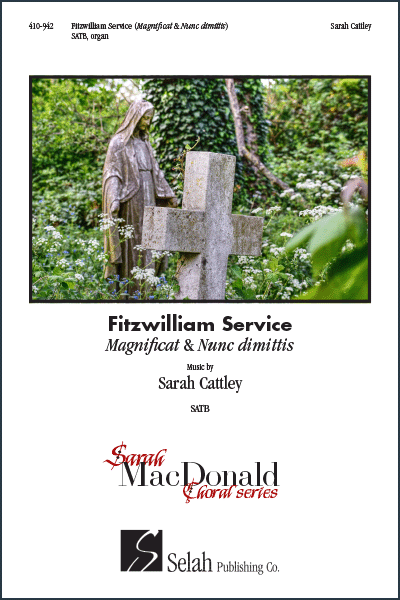|
Composer
Sarah Cattley
Text Luke 1:46-55; 2:29-32
Voicing SATB, organ
Topics Communion, Evensong
Lectionary usage Advent, Christmas
Price $3.65 (U.S.)
Length 4' 00" + 3' 10" Released 11/2021
Catalog no. 410-942
Difficulty Mod. difficult
|
Order now!
Order PDF download!
Min. of 5
Description
Written for the Fitzwilliam College Chapel Choir, this setting of the evening canticles is an SATB version of the original scoring for treble voices and organ (Selah 410-941). The dance-like Magnificat makes effective use of syncopation and hemiola. The Nunc dimittis contains vocal lines that contrast chant-like repeated notes with wide, expressive leaps. The two canticles are motivically linked via the shared Gloria: the slow first part alludes to the Nunc dimittis music, and the energetic ending comes from the Magnificat, thus providing both foreshadowing and reprise.
Texts
My soul doth magnify the Lord
And my spirit hath rejoiced in God my Saviour.
For he hath regarded the lowliness of his handmaiden.
For behold from henceforth all generations shall call me blessed.
For he that is mighty hath magnified me
and holy is his name.
And his mercy is on them that fear him
Throughout all generations.
He hath showed strength with his arm,
he hath scattered the proud in the imagination of their hearts.
He hath put down the mighty from their seat
and hath exalted the humble and meek.
He hath filled the hungry with good things
and the rich he hath sent empty away.
He remembering his mercy hath holpen his servant Israel,
As he promised to our forefathers, Abraham, and his seed for ever.
Glory be to the Father, and to the Son and to the Holy Ghost;
as it was in the beginning, is now and ever shall be,
world without end. Amen.
--Luke 1:46-55
Lord, now lettest thou thy servant depart in peace
according to thy word.
For mine eyes have seen thy salvation which thou hast prepared
before the face of all people.
To be a light to lighten the Gentiles
and to be the glory of thy people Israel.
Glory be to the Father and to the Son and to the Holy Ghost;
as it was in the beginning, is now and ever shall be
world without end, Amen.
--Luke 2:29-32
|
|


Review
"This very attractive evening service written for treble voices of the Fitzwilliam College Chapel Choir, was later revised by the composer for full SATB choir. (The SSA version is also available from Selah, catalog number 410-941, and was reviewed in the Journal in the March 2020 issue.) The Magnificat, nominally in F-minor, is introspective and hopeful, moving in a nimble dance. The tempo favors a one beat per bar 3/4 time, which allows Cattley to play rhythmic games, including subdividing measures first in 6/8 and later by strengthening the duple pulse to allow for four pulses per measure. The quick alternation between rhythmic beats will require a little practice to become intuitive, yet her careful preparation makes the different organizations of the beat feel natural. Plenty of unison lines for trebles and basses create sustained passages of two-part harmony, always reinforced by the organ accompaniment. Even with a few moments of part division in sopranos and altos, this is music that would work well for smaller ensembles or as an introductory set of Magnificat and Nunc dimittis for choirs less accustomed to singing evensong. The organ part is written in two staves throughout with only a few obvious moments of obbligato pedal. The modest writing of the accompaniment favors organists who conduct from the console. Cattley’s rich harmonic language makes generous use of sumptuous chords with added sevenths and ninths, imbuing the music with a richness. The Gloria Patri that caps the Magnificat shifts to F major without a significant change of mood, ultimately cadencing on a calm D minor. The Nunc dimittis maintains the general feel of D minor and the quiet joy of the Magnificat. The Gloria Patri returns to F major and is a rhythmically altered version of the ending of the first canticle. The final cadence, however, settles into a gentle mezzo piano, contrasting with the fortissimo ending of the previous canticle. Choirs of all skill levels would enjoy bringing this evening setting into regular rotation." -AAM Journal, Nov. 2021 |



